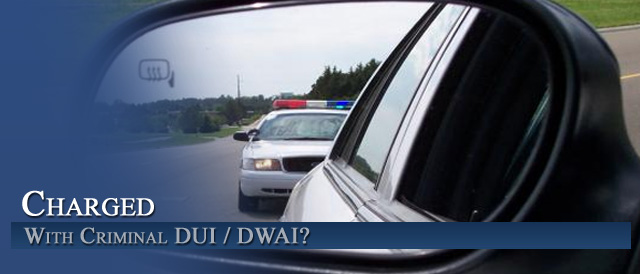
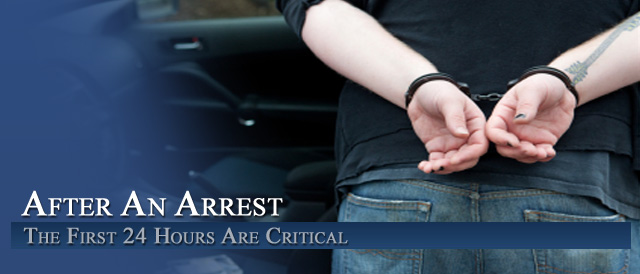

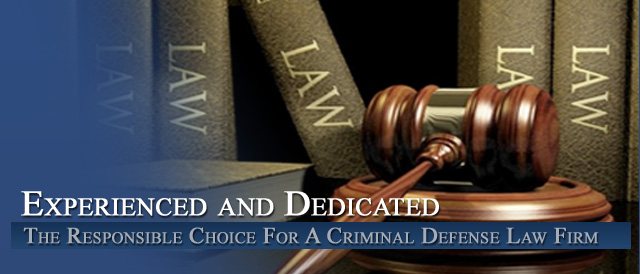
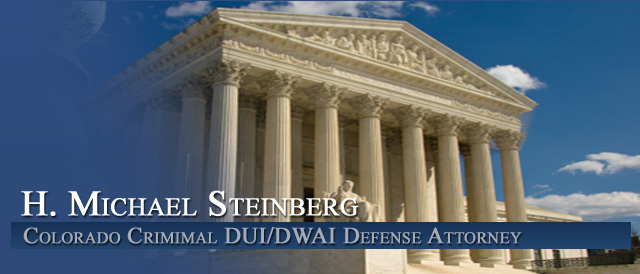
Colorado Criminal Law – Understanding Colorado Traffic Stop Laws Regarding Arrest & Custody
By H. Michael Steinberg – Colorado Criminal DUI DWAI DUID Crimes Lawyer – Attorney
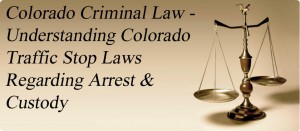 Colorado Criminal Law – Understanding Colorado Traffic Stop Laws Regarding Arrest & Custody – Am I Under “Arrest” In A Colorado Traffic Stop Context – Colorado Arrests for Traffic Violation Situations .
Colorado Criminal Law – Understanding Colorado Traffic Stop Laws Regarding Arrest & Custody – Am I Under “Arrest” In A Colorado Traffic Stop Context – Colorado Arrests for Traffic Violation Situations .
Limitations on the right of the police to make arrests are a creature of statute and Constitutional Law. Traffic cases present a different scenario than most other Colorado criminal arrests. The arrest guidelines traffic stops follow different rules.
In Colorado there are essentially two types of arrests:
1. Custodial Arrests – custodial arrests are seizures of the person for the purpose of taking a person to a detention facility for booking procedures and the subsequent filing of criminal charges,
2. Non-Custodial Arrests are “temporary detentions” of individuals for the purpose of issuing a written summon.
How Does One Distinguish a Custodial From A Non-Custodial Arrest?
The main difference is the length of time of the detention by the law enforcement involved.
A full search – (not a protective “pat down” for weapons) of the detained person can only happen legally if there is a full custodial arrest. If an arrest is non-custodial the police can only conduct a pat-down search for weapons if there is a concern for officer safety. If an arrest is non-custodial and the officer has probable cause to arrest then the police can search for the “instrumentalities or evidence of the a specific crime.”
Several Colorado Laws Govern The Rights Of The Police To Make An Arrest
The first of these is 42-4-1707 – which law governs the legal rights of the police to use a summons (a ticket) or to make an arrest. What follows is the law with annotations by the author:
� 42-4-1707. Summons and complaint or penalty assessment notice for misdemeanors, petty offenses, and misdemeanor traffic offenses – release – registration
[HMS – This section – addresses two issues – (1) if the crime committed is a penalty assessment crime under 42-4-1701(5)(a) – the officer must use a summons and CANNOT make an arrest. (2) If the crime is pursuant to certain sections of 42-4-1705 (below) the person MUST be arrested and taken before a judge and (3) describes what must be in the summons under Colorado Law and how a summons must be served on a minor.
(1) (a) Whenever a person commits a violation of this title punishable as a misdemeanor, petty offense, or misdemeanor traffic offense, other than a violation for which a penalty assessment notice may be issued in accordance with the provisions of section 42-4-1701(5) (a), and such person is not required by the provisions of section 42-4-1705 to be arrested and taken without unnecessary delay before a county judge,
the peace officer may issue and serve upon the defendant a summons and complaint which shall contain the name and address of the defendant, the license number of the vehicle involved, if any, the number of the defendant’s driver’s license, if any, a citation of the statute alleged to have been violated, a brief description of the offense, the date and approximate location thereof, and the date the summons and complaint is served on the defendant; shall direct the defendant to appear in a specified county court at a specified time and place; shall be signed by the peace officer; and shall contain a place for the defendant to execute a written promise to appear at the time and place specified in the summons portion of the summons and complaint.
(b) A summons and complaint issued and served pursuant to paragraph (a) of this subsection (1) on a minor under the age of eighteen years shall also contain or be accompanied by a document containing an advisement to the minor that the minor’s parent or legal guardian, if known, shall be notified by the court from which the summons is issued and be required to appear with the minor at the minor’s court hearing or hearings.
[HMS – Many people believe that any mistake or other defect in the summons (ticket) means the case must be dismissed. This is not true. The following section explains why that is:
(2) If a peace officer issues and serves a summons and complaint to appear in any court upon the defendant as described in subsection (1) of this section, any defect in form in such summons and complaint regarding:
- the name and address of the defendant,
- the license number of the vehicle involved, if any,
- the number of the defendant’s driver’s license, if any,
- the date and approximate location thereof,
- and the date the summons and complaint is served on the defendant
….may be cured by amendment at any time prior to trial or any time before verdict or findings upon an oral motion by the prosecuting attorney after notice to the defendant and an opportunity for a hearing. No such amendment shall be permitted if substantial rights of the defendant are prejudiced. No summons and complaint shall be considered defective so as to be cause for dismissal solely because of a defect in form in such summons and complaint as described in this subsection (2).
[HMS – The following section (3)(a) describes what should be in the Colorado Penalty Assessment Notice and how the notice should be given to a juvenile target:
(3) (a) Whenever a penalty assessment notice for a misdemeanor, petty offense, or misdemeanor traffic offense is issued pursuant to section 42-4-1701(5) (a), the penalty assessment notice that shall be served upon the defendant by the peace
officer shall contain…:
the name and address of the defendant, the license number of the vehicle involved, if any, the number of the defendant’s driver’s license, if any, a citation of the statute alleged to have been violated, a brief description of the offense, the date and approximate location thereof, the amount of the penalty prescribed for the offense, the amount of the surcharges thereon pursuant to sections 24-4.1-119(1) (f), 24-4.2-104(1), and 24-33.5-415.6 , C.R.S., the number of points, if any, prescribed for the offense pursuant to section 42-2-127, and the date the penalty assessment notice is served on the defendant; shall direct the defendant to appear in a specified county court at a specified time and place in the event the penalty and surcharges thereon are not paid; shall be signed by the peace officer; and shall contain a place for the defendant to elect to execute a signed acknowledgment of guilt and an agreement to pay the penalty prescribed and surcharges thereon within twenty days, as well as such other information as may be required by law to constitute the penalty assessment notice to be a summons and complaint, should the prescribed penalty and surcharges thereon not be paid within the time allowed in section 42-4-1701 .
(a.5)A penalty assessment notice issued and served pursuant to paragraph (a) of this subsection (3) on a minor under the age of eighteen years shall also contain or be accompanied by a document containing:
(I) A preprinted declaration stating that the minor’s parent or legal guardian has reviewed the contents of the penalty assessment notice with the minor;
(II) Preprinted signature lines following the declaration on which the reviewing person described in subparagraph (I) of this paragraph (a.5) shall affix his or her signature and for a notary public to duly acknowledge the reviewing person’s signature; and
(III) An advisement to the minor that:
(A) The minor shall, within seventy-two hours after service of the penalty assessment notice, inform his or her parent or legal guardian that the minor has received a penalty assessment notice;
(B) The parent or legal guardian of the minor is required by law to review and sign the penalty assessment notice and to have his or her signature duly acknowledged by a notary public; and
(C) Noncompliance with the requirement set forth in sub-subparagraph
(B) of this subparagraph (III) shall result in the minor and the parent or legal guardian of the minor being required to appear in court pursuant to sections 42-4-1710(1) (b), 42-4-1710 (1.5), and 42-4- 1716(4) .
(b) One copy of said penalty assessment notice shall be served upon the defendant by the peace officer and one copy sent to the supervisor within the department and such other copies sent as may be required by rule of the department to govern the internal administration of this article between the department and the Colorado state patrol.
(4) (a) The time specified in the summons portion of said summons and complaint must be at least twenty days after the date such summons and complaint is served, unless the defendant shall demand an earlier court appearance date.
(b) The time specified in the summons portion of said penalty assessment notice shall be at least thirty days but not more than ninety days after the date such penalty assessment notice is served, unless the defendant shall demand an earlier court appearance date.
(5) The place specified in the summons portion of said summons and complaint or of the penalty assessment notice must be a county court within the county in which the offense is alleged to have been committed.
(6) If the defendant is otherwise eligible to be issued a summons and complaint or a penalty assessment notice for a violation of this title punishable as a misdemeanor, petty offense, or misdemeanor traffic offense and if the defendant does not possess a valid Colorado driver’s license, the defendant, in order to secure release, as provided in this section, must either consent to be taken by the officer to the nearest mailbox and to mail the amount of the penalty and surcharges thereon to the department or must execute a promise to appear in court on the penalty assessment notice or on the summons and complaint.
If the defendant does possess a valid Colorado driver’s license, the defendant shall not be required to execute a promise to appear on the penalty assessment notice or on the summons and complaint. The peace officer shall not require any person who is eligible to be issued a summons and complaint or a penalty assessment notice for a violation of this title to produce or divulge such person’s social security number.
(7) Any officer violating any of the provisions of this section is guilty of misconduct in office and shall be subject to removal from office
Colorado State Traffic Infractions Arrests – An Important Point
Again – it should be restated – no arrest, even of non-residents, can be made for traffic infractions which are listed in � 42-4-1701. Traffic offenses and infractions classified – penalties – penalty and surcharge schedule A person who refuses to sign or accept the infraction ticket may not be arrested. In this situation – the officer will note – refused to sign and that legally suffices.
Other Kinds Of Colorado Traffic Crimes – What About Arrests For Class 1 & Class 2 State Traffic Offenses?
Class 1 and Class 2 traffic charges fall under 42-4-1705 (1).
� 42-4-1705. Person arrested to be taken before the proper court
[HMS – When you see the word SHALL in a Colorado law – it means the police must perform the action ordered by the law. So -in the following section (1) – IF a police officer makes a custodial arrest – that person falls within the requirements of this section. Some crimes require an arrest – others allow the officer to decide whether to arrest or to issue a sumons.]
(1) Whenever a person is arrested for any violation of this article punishable as a misdemeanor, the arrested person shall be taken without unnecessary delay before a county judge who has jurisdiction of such offense as provided by law, in any of the following cases:
(a) When a person arrested demands an appearance without unnecessary delay before a judge;
(b) When the person is arrested and charged with an offense under this article causing or contributing to an accident resulting in injury or death to any person;
(c) When the person is arrested and charged with DUI, DUI per se, or UDD;
(d) When the person is arrested upon a charge of failure to stop in the event of an accident causing death, personal injuries, or damage to property;
(e) In any other event when the provisions of section 42-4-1701(5) (b) and (5) ( c ) apply and the person arrested refuses to give a written promise to appear in court as provided in section 42-4-1707 .
(2) Whenever any person is arrested by a police officer for any violation of this article punishable as a misdemeanor and is not required to be taken before a county judge as provided in subsection (1) of this section, the arrested person shall, in the discretion of the officer, either be given a written notice or summons to appear in court as provided in section 42-4-1707 or be taken without unnecessary delay before a county judge who has jurisdiction of such offense when the arrested person does not furnish satisfactory evidence of identity or when the officer has reasonable and probable grounds to believe the person will disregard a written promise to appear in court. The court shall provide a bail bond schedule and available personnel to accept adequate security for such bail.
(2.5) In any case in which the arrested person that is taken before a county judge pursuant to subsection (1) or (2) of this section is a child, as defined in section 19-1-103(18) , C.R.S., the provisions of section 42-4-1706(2) shall apply.
(3) Any other provision of law to the contrary notwithstanding, a police officer may place a person who has been arrested and charged with DUI, DUI per se, or UDD and who has been given a written notice or summons to appear in court as provided in section 42-4- 1707 in a state-approved treatment facility for alcoholism even though entry or other record of such arrest and charge has been made. Such placement shall be governed by article 81 of title 27, C.R.S., except where in conflict with this section.
Quick Summary of � 42-4-1705. Person arrested to be taken before the proper court.
This statute says that when an arrest is made for any misdemeanor in the law, the arrested person shall be taken without unnecessary delay before a county judge when the arrestee:
1. Demands an immediate appearance before a judge;
2. Is charged with causing or contributing to an accident resulting in injury or death to any person;
3. Is arrested for driving under the influence of intoxicating liquor or controlled substance;
4. Is arrested for failure to stop in the event of an accident causing death, personal injuries or damage to property; or
5. Refuses to sign a Penalty Assessment ticket or summons. (Remember that 42-4-1707 (6) states that persons with valid Colorado drivers’ licenses are not required to sign).
BUT – If one of the above five situations is not present, then C.R.S. 42-4-1705 (2) states that the arrestee should only be taken before a county judge if:
1. The person does not furnish satisfactory evidence of identity; or
2. The officer has reasonable and probable grounds to believe the person will disregard a written promise to appear in court.
Colorado Crimes Felonies, Misdemeanors, Misdemeanor Traffic Offenses, and Traffic Infractions.
Some Basic Constitutional Law Information
The Fourth Amendment to the United States Constitution does NOT prohibit a police officer from making a full custodial arrest and conducting a search incident to that arrest for felonies, misdemeanors, OR petty criminal offenses that are committed the officer’s presence.
Similarly, Colorado’s constitution presumes that an arrest for a criminal violation – if predicated upon probable cause is allowed for ANY crime, not just a serious crime.
The LIMITS on the authority of the police to make arrests are based on Statutes – Laws passed by the State of Colorado which restrict the authority of the police.
An Example – Colorado Petty Offenses
If we know that a police officer may make an arrest when a crime occurs in his or her presence. � 16-3-102. If the crime committed is a petty offense – such as shoplifting – the arresting officer MAY either take the arrested suspect Before a judge, or he and or she can RELEASE the suspect after issuing a penalty assessment ticket. � 16-2-201.
Thus the arrest can be CUSTODIAL OR NON-CUSTODIAL depending on the discretionary authority granted to the officer.
So – if a Colorado statute mandates that a police officer issue a summons and complaint, taking away the officers discretion – such as in Traffic Penalty Assessment Tickets – the officers may only make a non-custodial arrest.
BUT – when a law gives Colorado police a choice of procedures – there is no limit the officer’s ability to carry out a full custodial arrest.
Colorado Criminal Law – Understanding Colorado Traffic Stop Laws Regarding Arrest & Custody
If you found any information I have provided on this web page article helpful please click my Plus+1 button below so that others may also find it.
Never stop fighting – never stop believing in yourself and your right to due process of law.
ABOUT THE AUTHOR: H. Michael Steinberg – Email The Author at [email protected] – A Denver Colorado Criminal Defense Lawyer – or call his office at 303-627-7777 during business hours – or call his cell if you cannot wait and need his immediate assistance – 720-220-2277. Attorney H. Michael Steinberg is passionate about criminal defense. His extensive knowledge and experience of Colorado Criminal Law gives him the edge you need to properly handle your case.
A Disclaimer: While every effort has been made to ensure the accuracy of this publication, it is not intended to provide legal advice as individual situations will differ and should be discussed with an expert and/or lawyer. If you are seeking counsel there maybe other more specific technical or legal advice on the information provided and related topics. For that, please contact the author.
If you are charged with A Colorado crime or you have questions about the topic of this article – Colorado Criminal Law – Understanding Colorado Traffic Stop Laws Regarding Arrest & Custody, please call our office. The Law Offices of H. Michael Steinberg, in Denver, Colorado, provide criminal defense clients with effective, efficient, intelligent and strong legal advocacy. We can educate you and help you navigate the stressful and complex legal process related to your criminal defense issue.
 H. Michael Steinberg, is a Denver, Colorado criminal defense lawyer with over 40 years of day to day courtroom experience – specializing in Colorado Criminal Law along the Front Range. He will provide you with a free initial case consultation to evaluate your legal issues and to answer your questions with an honest assessment of your options. Remember, it costs NOTHING to discuss your case. Call now for an immediate free phone consultation.
H. Michael Steinberg, is a Denver, Colorado criminal defense lawyer with over 40 years of day to day courtroom experience – specializing in Colorado Criminal Law along the Front Range. He will provide you with a free initial case consultation to evaluate your legal issues and to answer your questions with an honest assessment of your options. Remember, it costs NOTHING to discuss your case. Call now for an immediate free phone consultation.
Helping Clients To Make Informed Decisions In the Defense of Colorado Criminal Cases.
Contact A Lawyer with Three Decades of Experience as a Denver Criminal Attorney at The Steinberg Colorado Criminal Defense Law Firm today.
Colorado Defense Lawyer H. Michael Steinberg regularly appears and provides solid criminal defense for clients throughout the Front Range of Colorado – including the courts of:
Adams County (Adams County criminal defense lawyer), Arapahoe County (Arapahoe County criminal defense lawyer), City and County of Boulder (Boulder County criminal defense lawyer), City and County of Broomfield (Broomfield County criminal defense lawyer), City and County of Denver (Denver criminal defense lawyer), Douglas County (Douglas County criminal defense lawyer), El Paso County – Colorado Springs (Colorado Springs criminal defense lawyer), Gilpin County (Gilpin County criminal defense lawyer), Jefferson County (Jefferson County criminal defense lawyer), Larimer County, and Weld County ( Larimer and Weld County criminal defense lawyer,….
and all the other cities and counties of Colorado along the I-25 Corridor… on cases involving the subject of this article -Colorado Criminal Law – Understanding Colorado Traffic Stop Laws Regarding Arrest & Custody/
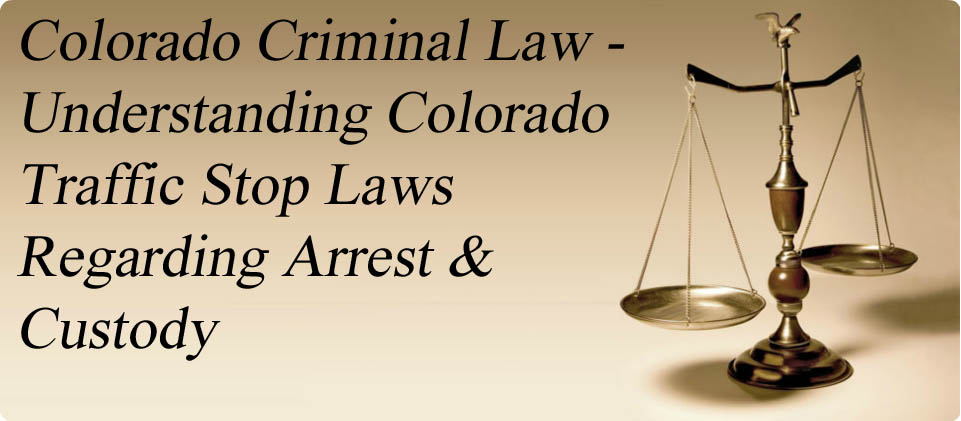
Other Articles of Interest:
- Attacking Your Colorado DUI – DWAI Case – Common Tactical Approaches
- Colorado DUI Law – DUI Probation Violations – Revocation Of Probation
- Colorado Criminal Law – Know Your Rights – Remain Silent – Remain Silent – Remain Silent
- Colorado DUI Probation Violations – Why Time Is Of The Essence
- 2017 Colorado Case – Proves Once Again – Never Talk To The Police!












